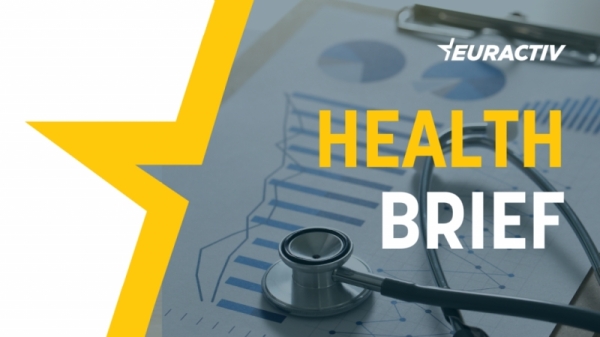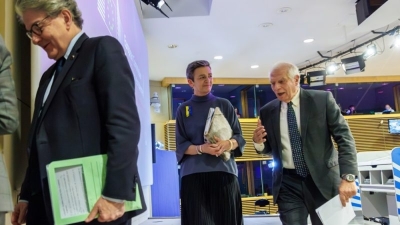A new road for EU global health action

With the previous foundations of the EU’s approach to global health dating back to 2010, the European Commission’s presentation of the EU Global Health Strategy on 30 November 2022 was much needed.
One year and two months later, the Council finally adopted conclusions on the strategy on Monday 29 January.
A fresh approach to global health is highly necessary. Not only because the world is very different today, but also due to the long and difficult international negotiations to prevent and prepare the world for the inevitable next pandemic.
First of all in the negotiations for a waiver of the World Trade Organisation (WTO) Council on Trade-related aspects of Intellectual Property Rights (TRIPS) on COVID-19 vaccines in 2022.
Now, the ongoing negotiations for a pandemic treaty and revised International Health Regulations among members of the World Health Organisation (WHO).
In a nutshell, the Council conclusions “welcome” the Commission’s strategy, which is supposed to guide EU action on global health until 2030 and show Europe’s “central role” in global health, as Sandra Gallina, director-general of the Commission’s health service DG SANTE, told Euractiv back in 2022.
The goal is to focus on three “interrelated priorities”: delivering better health and well-being of people; strengthening health systems and advancing universal health coverage; and combating health threats by applying an interdisciplinary One-Health approach.
Now, the big question is what action it will inspire.
The EU, along with its member states and other wealthy countries, were accused of significantly watering down the WTO COVID-19 vaccine waiver and now of blocking an extension to include COVID-19 treatments and diagnostics.
Following that disappointing affair, it appears, despite very untransparent negotiations, that similar things are happening in the ongoing negotiations for a WHO pandemic treaty due to be finalised in May 2024.
With the big words attached to the EU’s global health goals, it will now be crucial for countries to make international agreements that result in necessary changes in global health worldwide.
EU News
-
- The ongoing saga of the in vitro diagnostics regulation.
- The European Parliament and Council agree on new rules for wastewater management.
- Big pharma companies still lack transparency, new study found.
- The European Chemical Agency sets up its goals for the next five years.
- The ongoing saga of the in vitro diagnostics regulation. The Commission released on Tuesday (23 January) a proposal to review the timelines for companies to comply with the regulation to ensure availability and avoid shortages. While EU institutions and stakeholders agree with the extension the reasons for the difficulties in adherence to the rules create disagreements. A year and a half after the regulation entered into play (May 2022), most companies are struggling to reach the deadline, which could cause shortages if uncertified devices end up out of the market. The extension guarantees manufacturers approximately two additional years until the rules start to apply. With the new provisions and depending on the type of device, the end of the transition period will range from 2027 for high individual and public health risk devices to 2029 for lower-risk devices.
Marta Iraola wrote about this here. - The European Parliament and Council agree on new rules for wastewater management. EU institutions reached an agreement on the rules for the collection, treatment and discharge of urban wastewater to protect the environment and human health. The compromise strengthens the requirements for monitoring the presence in wastewater of the so-called ‘forever chemicals’ (PFAS), microplastics and pathogens, as well as antimicrobial resistance. The original text proposed by the European Commission in October last year highlighted that the need to remove the micro-pollutants from urban wastewater would imply additional costs related to monitoring and new advanced equipment to be installed in the current wastewater treatment plants. The Commission identified pharmaceutical and cosmetic residues as the main sources of micro-pollutants currently found in the wastewater and called for extended producer responsibility (EPR) of these two product groups to cover the costs of additional treatment (quaternary treatment) to remove micro-pollutants from urban wastewater. Aiming to ensure the availability, affordability and accessibility of vital products such as medicines and hygiene or sun protection products, the new rules foresee that at least 80% of the costs will be covered by producers, complemented by national financing.
- Big pharma companies still lack transparency, new study found. In January 2023, two health NGOs, Global Health Advocates (GHA) and StopAids, published a report on how the pharmaceutical industry disproportionately influenced EU institutions resulting in harm to public health, particularly during the COVID-19 pandemic. On Wednesday (24 January), GHA published a follow-up study and came to the conclusion that “one year on, it appears, sadly, that little has changed”. As an example, GHA writes that the Commission is failing to provide the text messages between Ursula von der Leyen, and Pfizer CEO Albert Bourla when negotiating the third contract of COVID vaccines. The health NGO also says that the vaccine contracts have still not been made public despite public money being used. According to the NGO, the lack of transparency and information is “regrettable”. Read the full statement here.
- The European Chemical Agency sets up its goals for the next five years. The European Chemicals Agency (ECHA) published on Tuesday (30 January) its Strategy Statement 2024-2028 detailing the agency’s goals and priorities to protect health and the environment through its work for chemical safety. “The new ECHA Strategy reflects the broadening of our legal mandate in support of the European Union’s ambitious goals on chemical safety, and its commitment to the protection of health and the environment”, said Paul Krajnik, Chair of ECHA’s Management Board, in a press release. The strategy explains that ECHA will inform EU chemical and environmental policy by working with relevant EU agencies and bodies to deliver Chemical Strategy for Sustainability (CSS) actions and objectives and provide scientific and technical advice on chemicals to EU policymakers, among others.
News from the Capitals

Three Dutch research institutions have teamed up to create a steering group to collaborate more intensively in the field of animal research and animal-free innovations. Read more.
///
STOCKHOLM
Sweden’s healthcare crisis deepens amid huge deficits. Forthcoming cuts to psychiatric care at Sweden’s largest hospital could lead to more deaths, 29 doctors from the hospital have warned, in the latest example of the country’s deepening health crisis. Read more.
///
PRAGUE
Debate intensifies in Czechia over controversial medicine distribution channel. A fierce debate is raging in Czechia about whether the country should retain or end the so-called protected distribution channel, which obliges pharmaceutical manufacturers to supply selected suppliers with medicines. Read more.
///
SOFIA
Sofia sees ‘turbulence ahead’ for poorer countries from the proposed pharma package. The Bulgarian government believes the European Commission’s proposals for new pharmaceutical legislation could pose risks to its healthcare system, and instead, it will push for measures to lower prices for lower-income countries. Read more.
Read more with Euractiv




